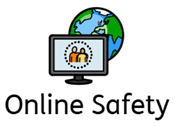Online Safety

As technology continues to grow, so does the concern over whether your child is safe online. Use these useful links below to ensure your child is staying safe.
NSPCC
Yves Geleyn continues the award winning Share Aware campaign for NSPCC named Mia, voiced by comedic genius Catherine Tate, as she confidently navigates the outside world but then needs a bit more guidance in the murkier world of the internet.
-
E-Safety Tips For Parents
E-safety tips for parents of primary school children
-
Films To Watch With Your Children
A collection of child friendly videos to watch with your children.
-
Digital Parenting Magazine
A useful online magazine which covers a range of topics
-
Social Media Guides
Downloadable guides for a range of social media apps and sites
Play Like Share
https://www.thinkuknow.co.uk/8_10/watch/
Play Like Share follows the adventures of Sam, Ellie and Alfie as they form a band and enter their school’s Battle of the Bands contest, taking on the mean but ‘cool’ Popcorn Wizards as they go. The three friends learn that while the internet can help, they need to use it wisely and safely.
The aim of the films is to help 8-10 year olds learn how to stay safe online. In particular, the films teach them to spot the early signs of manipulative, pressurising and threatening behaviour by people they might meet online, and develop their confidence to respond safely and get help.
How you can use Play Like Share to help keep your child safe online
You can watch Play Like Share with your child and use this to start a conversation with your child about the internet and staying safe. All three episodes can be found on the CEOP YouTube channel.
When opening the conversation with your child start with positives, finding out as much as you can about what your child does online and what it means to them.
Things you could try:
- Ask your child to show you their favourite websites, apps and social media services and what they do on them. Listen and show interest. You could also encourage them to teach you the basics of the site or app.
- Ask your child if anything ever bothers or worries them about going online. You could use examples of events from the films and ask if they’ve ever heard of something similar happening. Talk in general about what children can do to stay safe online.
- Use examples from Play Like Share to start a conversation about online ‘friends’ or ‘followers’. Ask them about who they chat to online, and whether they know and trust them ‘in real life’.
- Talk about the importance of privacy settings and how they can help your child stay in control of what they share with others. Together, look at the privacy settings for the services they use, encourage them to only share things with people they know and trust in real life.
- Using examples from Play Like Share, talk to your child about what it might be appropriate or inappropriate to share online – this includes photos, videos, comments and personal information.
- Talk to your child about how their online actions can affect others. Remind them to consider how someone else might feel before they post or share something.
- Ensure your child understands that if anything ever happens online which worries or upsets them, they should always tell you.
- Explain that you would never blame them for anything that might happen online, and you will always give them calm and non-judgemental support.
- Make online safety an ongoing conversation in your house and involve the rest of the family in the conversation too.
Other Useful Links
- www.saferinternet.org.uk - UK Safer Internet Centre has practical guides regarding parental controls and reporting concerns
- InternetMatters.org - a not-for-profit organisation that has a simple purpose – to help keep children safe in the digital world.
- www.childnet.com - useful discussion starters and top tips for parents
- www.thinkuknow.co.uk - support regarding online abuse and exploitation
- www.getsafeonline.org - advice regarding online security
- www.nspcc.org.uk/onlinesafety - advice from the NSPCC about a range of online safety issues including cyberbullying, sexting and social networking (the Share Aware campaign is excellent for primary schools)
- www.net-aware.org.uk - NSPCC in partnership with parents and children has reviewed 60+ of the most popular apps and websites and is a great tool for parents

